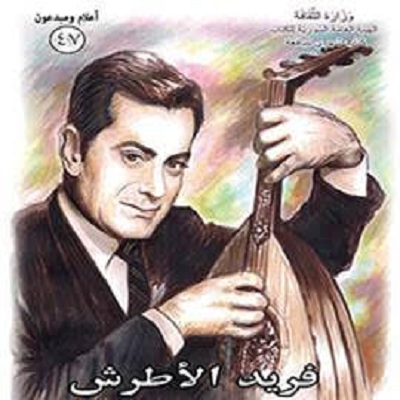He modified the western tunes so as to be played on the oud.
When Farid al-Atrash is mentioned, many words with broad connotations are associated with him as he is the skilled artist, the creative composer, the sensitive emotional singer, and the actor who contributed to the spread of songs in the cinema.
In his book, “Farid al-Atrash” – recently issued by the Syrian General Book Authority , the Ministry of Culture , Dr. Fayez al-Dayeh says about Farid al-Atrash: “He is an international artist, whose fame was great and had a very large audience listening to his songs in many countries. He composed many tunes which were sung by singers in many languages, including French, Russian, Persian, Turkish, Spanish, and Greek. This artist, who belongs to an ancient Syrian family, was born in Al-Qurayyah near the city of As-Sweida in 1915 and died in Beirut in 1974.
Al-Dayeh adds in recounting his life’s career. “Al-Atrash had acquired high artistic experiences in playing the oud from his musivsl environment at home, especially with his mother, who expanded her activities and recorded a number of songs on CDs, and from the guests and friends of the family of artists who were famous in composing and playing music such as Farid Ghosen, Muhammad Al Qasbaji and Dawood Hosni. The oud became his best friend, especially by joining several important bands, including the famous Egyptian singer band, Ibrahim Hammoud , until the artist Badia Masabani gave him the opportunity to sing in a “casino” where artists were singing and performing various artistic shows.
His greatest opportunity was when the composer Medhat Asem, who was director of the music section of the Egyptian radio, which was widely spread in 1934, watched his performance and listened to his voice , so he asked him to perform a piece of music weekly through the concerts that the Radio used to broadcast periodically, thus the talented musician attracted the attention and admiration of the large number of the radio audiences In 1936 he was allowed to sing after passing a test attended by great musicians.
“1939 witnessed the most important stages of his life, as he joined the first-ranked artists such as Mohamed Abdel-Wahab and Umm Kulthum, when he was invited to participate in a concert that was broadcast live for the first time from the foot of the pyramids in the Egyptian Giza near Cairo. It was an amazing event that brought people around the radios. Later on, he was invited to record songs for London Radio in England. After achieving this great success,, Farid al-Atrash returned enthusiastically to Egypt to find that there were many opportunities that were waiting for him to enter the world of cinema, where the lyrical films were one of the most important works attracting the audience at that time”, he added.
Al-Dayeh went on to say : “1941 granted the most important artistic opportunity to Farid Al-Atrash, when he and his sister Amal, who was later called Asmahan, presented the movie (Victory of the Youth), where Farid was assigned to compose all the songs of the film which revealed the superior capabilities of Asmahan’s voice.
With the completion of this film, Farid al-Atrash managed to achieve success in the world of cinema through thirty-one films that lasted until the end of his life.He also established a production company that produced nine films”.
“Entering the cinema world, allowed him to compose musical compositions that express emotional states some of which are taking place in an ancient oriental atmosphere such as palaces, and other pieces of music representing modern situations, including the introduction of the song (Habib Al-Omer) in a movie of the same name. Farid al-Atrash has managed to impart the oriental character for what he takes from some international tunes and he himself referred to this, as he adapted some tunes that performed with Western instruments to be played on the oud, as in “Asturias” by (Alpinez), Which featured a musical introduction of “A Tale of my Love” song”.
On the other hand, we find that the original melodies of Farid attracted the world’s musicians to sing, or to be played by symphony bands, and recorded on discs, including the band “Frank Purcell”, as in (Ya Zahra fi Khayali and Habib Al-Omer). The musician Walid Ghalimia has indicated that Farid al-Atrash’s musical, lyrical and melodic pieces are the most prominent and most capable of being orchestral played,” Al-Dayeh concluded.
It is worth mentioning that Farid Al-Atrash composed and sang more than a hundred and seventy songs and composed nearly 100 lyrics for singers from different Arab countries.
Amal Farhat

